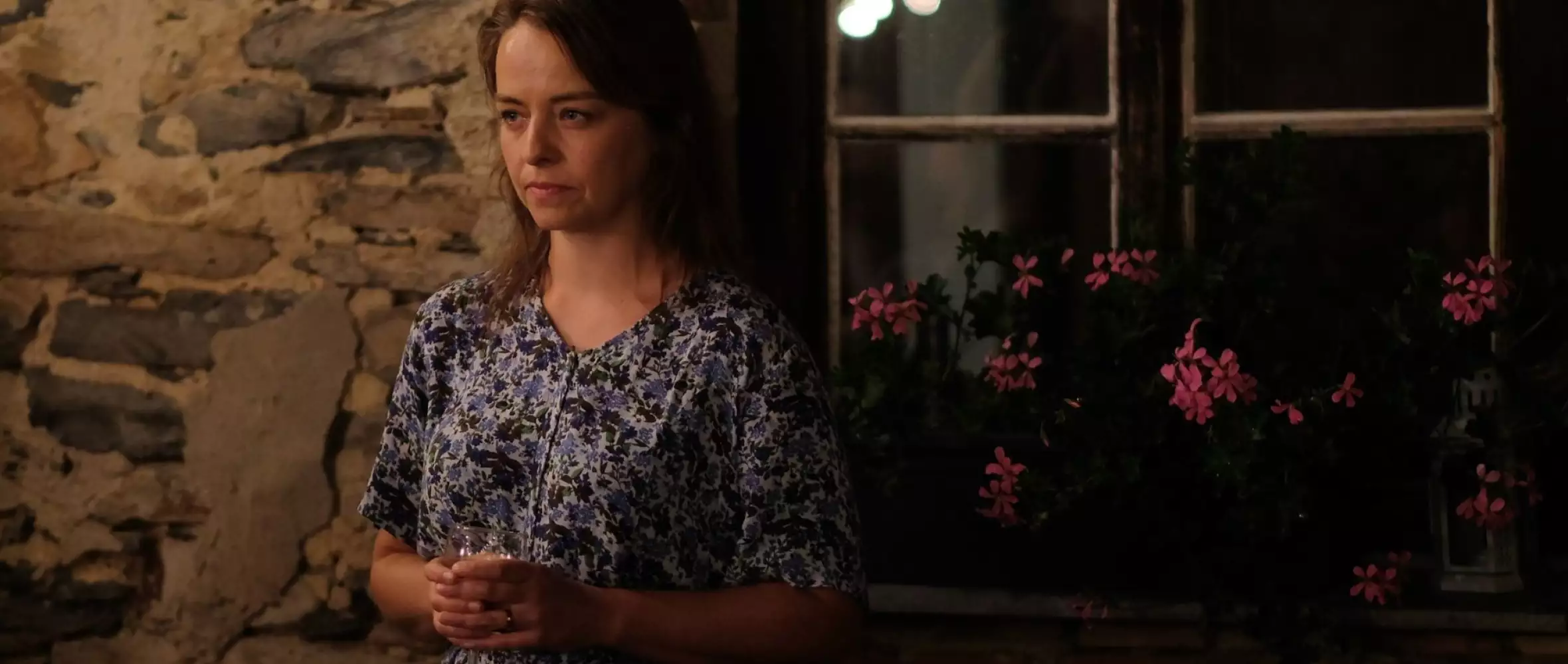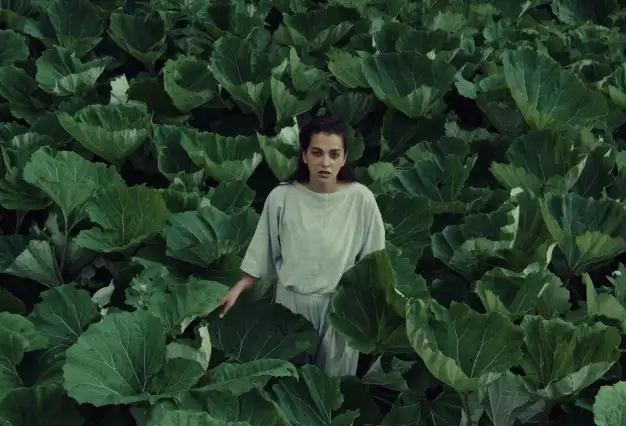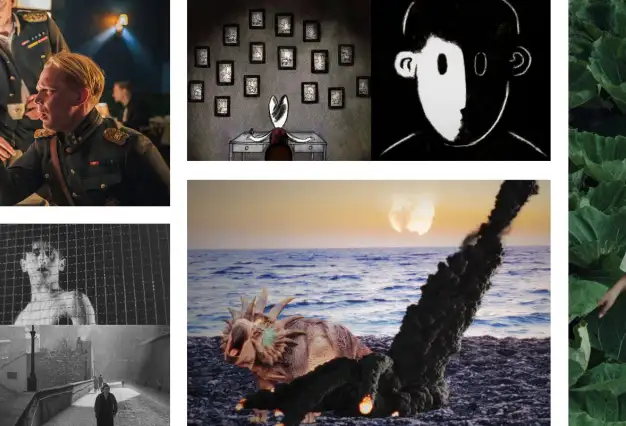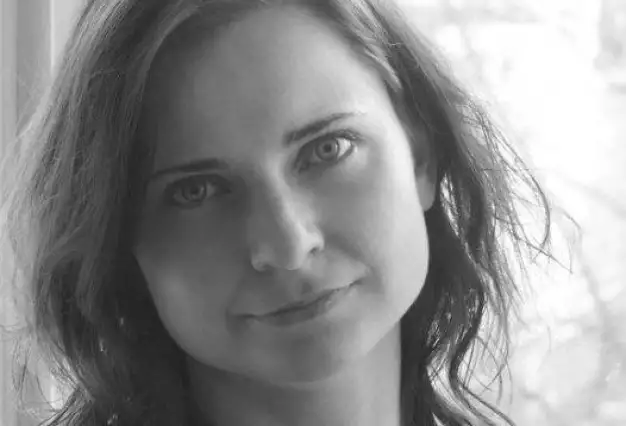
19 July 2023
Year of the Widow: Widowhood empowered
Year of the Widow: Widowhood empowered

Czech documentarist Veronika Lišková, celebrated for addressing uncharted subjects, delves into fiction with an unflinching exploration of a young widow's journey. This transformative tale confronts her raw grief and solitude as she reconstructs her life. In this psychological drama, Lišková boldly challenges societal taboos about bereavement, providing a discerning commentary on confronting death and survival in today's world.
Article by Martin Kudláč for CZECH FILM / Fall 2023
In a searing exploration of widowhood, Zuzana Pokorná chronicles her first twelve tumultuous months of bereavement in the article Year of the Widow (Respekt magazine 34/2014). Her diary-like narrative, imbued with visceral emotion and candid confessionals, brims with short, tense sentences that encapsulate a raw cocktail of surprise, shock, disbelief, and cynical observations of societal reactions and bureaucracy.
Her voice offers an unvarnished journey into the stark reality of losing a life partner, casting a spotlight on the emotional battlefield of the bereaved and the societal mechanisms that accompany the first year of widowhood. This gripping account caught the attention of Czech documentary filmmaker Veronika Lišková, whose initial intent to produce a documentary based on the article gradually morphed into a fiction project.
Lišková, along with screenwriter Eugen Liška, crafted a script inspired not just by Pokorná's compelling diaries, but also by family narratives, anecdotes from friends, and extensive research. The pair’s skillful weaving of reality and fiction resulted in a seamless blend of real-life situations and storytelling. In recognition of their work, Liška won the main screenwriting prize from the domestic Film Foundation in 2018. Year of the Widow became a testament to the courage and resilience of the bereaved, a mirror reflecting the often unspoken truths of grief and loneliness.
Widowhood exposed
In a stark examination of sudden bereavement, Petra's world is upended by her husband's unexpected demise, plunging her into widowhood. As the protagonist quickly learns, grief is compounded by a barrage of administrative tasks tied to 21st-century life — from managing accounts, mortgages, and loans to dealing with utility providers – creating a harsh, Kafkaesque bureaucratic labyrinth. Her fight for stability amidst spiraling existential uncertainty becomes a key focus of the narrative.
Aligning with Zuzana Pokorná's experience, the film delivers an unvarnished first-person view of sudden loss and its psychological aftermath. Rejecting romanticized portrayals, it confronts the taboo of grief with candidness and respect, depicting healing as a messy, unpredictable journey, encompassing despair, confusion, and even unexpected humor.
One of the film's most compelling facets is its intertwining of personal grief with social norms and bureaucratic obstacles. In a society that often struggles to acknowledge or accommodate grief, Petra navigates a thicket of societal expectations and legal proceedings. From grappling with probate processes to confronting how a widow is expected to behave, Year of the Widow exposes the unseen daily battles accompanying the loss of a partner or relative.
%20Cin%C3%A9motif%20Films_photo%20Richard%20Hodonick%C3%BD_small%20(1).jpg)
%20Cin%C3%A9motif%20Films_photo%20Richard%20Hodonick%C3%BD_small%20(8).jpg)
Widowhood remade
An intimate portrait of a deeply human experience, Year of the Widow's narrative, told almost entirely from Petra's perspective, situates audiences squarely within her reality — giving an intimate portrayal of her emotional resilience in the face of loss. The film captures a whirlwind of emotions: Petra's isolation, her confusion, moments of deep reflection, and small victories. This persistent focus on Petra's perspective offers viewers an unfiltered glimpse into the reality of widowhood, free of clichés or tropes.
While grief and the practical realities of loss are central to the story, the film's director reveals that the narrative arc isn't only about accepting widowhood. Instead, the film charts the first year of Petra's widowhood and her transformational journey — from a grieving widow to an independent woman reclaiming her life in the aftermath of an unimaginable loss.
Year of the Widow, however, is not solely Petra's story. This inter-generational psychological drama broadens the plot by introducing Petra's daughter, Dominika, and her mother-in-law, who add depth to the film. Their roles underscore the way that grief ripples through a family and a community, with each person experiencing it in unique and often complicated ways.
Widowhood dissected
Lišková, renowned for her sensitive and nuanced exploration of socially relevant themes, rose to prominence with her debut documentary feature, Daniel's World (2014), which boldly broached the controversial concept of “a good pedophile” at the Berlinale. Her documentary work, often rooted in raw human experiences, not only challenges societal norms, but also demonstrates a deep empathy for her characters, focusing on marginalized groups as well as the less understood aspects of society.
Her most recent documentary, The Visitors (2022), which debuted at the prestigious Locarno Film Festival, extends Lišková's unique storytelling approach. It weaves together daily reflections of the protagonist, research findings, video diary entries, and interviews with locals, providing a balanced, non-judgmental exploration of complex issues such as globalization, sustainability, and latent xenophobia.
The director views her move into fiction filmmaking as a natural progression, as she has previously blended documentary and fiction storytelling in her work. She continues to develop her auteur style in this fiction debut, utilizing documentary methodology for intimate observation of the protagonist, for enhancing subjectivity, and for narrative depth. Adopting social realism's minimalism, the upcoming psychological drama uses stark visuals and subdued hues to mirror the protagonist's mindset, prioritizing silence and ambient sound to portray isolation. This choice enhances emotional depth and authenticity in portraying solitude.
The film is structured in several parts, corresponding to the seasons, to depict the passage of time and the protagonist's evolving grief. These seasonal divisions not only symbolize different stages of mourning, but also underline the non-linear and cyclic nature of grief, thus adding universality to the narrative. Lišková acknowledges her film as blending two approaches, drawing from the single-shot scenes of Two Days, One Night by Luc and Jean-Pierre Dardenne and immersive work with the images of environment in Naomi Kawase’s The Mourning Forest. Lišková aims to incorporate more visual poetry within realism, achieved with the subtle handcam operation by rising DoP Dušan Husár (A Sensitive Person, BANGER.).
Lead actress Pavla Beretová (Bird Atlas) brings her personal experience to the central role of the widowed Petra, contributing to the script and delivering a committed performance. Newcomer Julie Šoucová (´Merican Chick) portrays the protagonist's daughter Dominika, and veteran Slovak actress Zuzana Kronerová (Ice Mother) takes on the role of the mother-in-law. Lišková's cast includes theater actors for their civil acting style, as well as non-professional actors for their unique authenticity.
%20Cin%C3%A9motif%20Films_photo%20Richard%20Hodonick%C3%BD_small%20(6).jpg)
%20Cin%C3%A9motif%20Films_photo%20Richard%20Hodonick%C3%BD_small%20(2).jpg)
Widowhood liberated
Originally developed under Artcam Films, Year of the Widow faced a production shift due to the untimely passing of producer Artemio Benki. Kristýna Michálek Květová of Cinémotif Films, who produced The Visitors and is also working on Lišková's upcoming project My Second Perfect Me, stepped in to see the film to completion. The character-driven narrative, observing three generations of women processing grief, appealed to Květová, who believes the film can break social taboos and stimulate important discussions about self-care and mental health, particularly among older generations.
The film is a tri-national production, with Slovak director Peter Kerekes and Slovak producer Anna Mach Rumanová of Kerekes Film (107 Mothers), as well as Croatian producer Miljenka Čogelja of Pipser (Safe Place) taking part in the project. The film has garnered financial support from the Czech Film Fund (altogether €372,000), the Slovak Audiovisual Fund, and the Croatian Audiovisual Center, as well as from the Czech regions of Pilsen and Ústí.
The principal photography, mapped across four seasons, will be executed in three phases and shot on location. Production is expected to wrap in January 2024, with a rough cut slated for March/April 2024 and post-production finalization by summer 2024. Květová is in talks with public broadcasters in the Czech Republic and Slovakia for potential partnerships and is actively seeking U.S. market distributors, as well as additional distribution partners. Negotiations for a sales agent to handle international rights are ongoing. CinemArt and Filmtopia will handle domestic and Slovak theatrical releases, respectively.
In line with Lišková's previous work, Year of the Widow serves as a social commentary. Echoing the sentiment of Adéla Komrzý's award-winning documentary Intensive Life Unit, Květová and Lišková aim to spark societal change and foster a better understanding of grief. The creators are also partnering with Czech NGOs which offer support to bereavers.
“We would love to create, in cooperation with the auteur of the initial diaries Ms. Zuzana Pokorná, some educational campaign that would provide a practical guide on dealing with the loss of a loved one, both psychologically and bureaucratically,” explains the director.
Year of the Widow aims to depict raw human emotion, navigating audiences through the turbulent path of grief, towards acceptance and rebirth. It embodies human resilience and celebrates the triumph of self-discovery over despair, championing the social mission of normalizing grief.
Related news
Related people
Veronika Lišková
Writer
Tomáš Michálek
Director,
Producer,
Story,
Film Contact
Czech Republic
Kristýna Michálek Květová
Cast
Czech Republic






